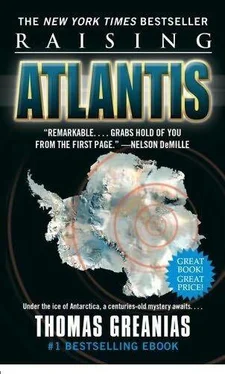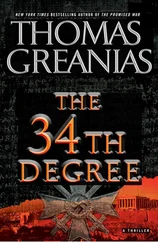She climbed out and surveyed her surroundings. Two ramparts of narrow steps wound to the ground on either side. In the center sat crates of equipment. In back was an iron gate, before some sort of entrance to the temple. Meanwhile, a tower and antiaircraft gun stood atop the summit overhead. There must have been a second helipad up there, because she could make out the blades of another chopper hanging over the side. She looked over the ledge. Down below were dune buggies, and even a Navy SEAL-type of rubber raft with an outboard motor tied at the base of the falls. Whoever these people were, they were well financed and well prepared.
The makeshift iron gate opened, and a man sauntered across the promontory. Like the other soldiers, he wore a camouflaged United Nations uniform. The only difference was that he was bareheaded and wore no badges or rank, yet she recognized him immediately.
He was Colonel Ali Zawas, an Egyptian air force colonel and scion of Egypt’s most prominent family of diplomats. He was born and raised in New York City until he graduated from the U.S. Air Force Academy and moved back to Cairo. More American than Egyptian. She had seen him several times before at the United Nations, once at the American University in Cairo. But he was always in dress uniform at formal functions, not in the menacing field fatigues he now sported. He also normally had dark, wavy hair, which was now shaved off.
Zawas paused in the center of the promontory before the group of soldiers. Jamil moved in smartly and saluted. Zawas waved it off. He was a handsome man with deep-set eyes. There was a brief exchange in Arabic. Serena couldn’t quite catch all of it, but the contempt on Zawas’s face was enough.
His eyes traveled over the men casually, and fixed on her. He stood there staring at her in the silence, then said something to Jamil, who walked over, grabbed Serena by the arm, and propelled her in front of him. She fought to control the panic that surged inside her, for fear would not help her now, and schooled herself to play it cool.
She kept her head down, but Zawas lifted her chin, and she looked into the dark eyes. “If you’re an Atlantean,” he said in English, “then this is indeed paradise. But I take it you are an American.”
She shook her head and said in a low voice, “No, Colonel, I’m from Rome.”
It took a moment for her Australian accent to register, and then she saw the shock of recognition. Then a broad, genuine smile crossed his face. “Sister Serghetti, it is you,” he said. “What on earth are you doing here?”
“It’s Doctor Serghetti, Colonel, and I was going to ask you the same question,” she said, looking around at his troops. “You don’t really expect me to believe you are acting on behalf of the United Nations?”
Zawas smiled. She realized he was amused that she was the one demanding answers. “Consider us representatives of certain Arab oil producers who have the most to lose from the discovery of alternative energy sources.” He took her arm and said casually over his shoulder, “Get to work, Jamil.”
Jamil gave them enough time to get clear then shouted something unintelligible that was drowned out in the immediate uproar as the soldiers began to break out equipment. Drills, seismic meters, metal detectors, explosives.
They reached the steps leading up to the iron gate and the entrance to the temple, and Zawas paused, turning to look at her, a slightly quizzical frown on his face.
“I didn’t recognize you at first,” he told her. “It’s been so long, and you’re usually not so dirty on those magazine covers.”
“Sorry to have disappointed you.”
“Not at all. I find it quite becoming.”
She studied him closely. Handsome, shrewd, even gentle if he wanted to be, she was sure of that.
“And why is that?”
“It brings you down to earth.” He smiled faintly, opened the front gate, and led her inside.
The chamber was sparsely furnished. Table, chairs, computers, a cot. As he closed the door, he took her backpack from her and dropped it on a chair.
“Please, sit down.”
He politely pulled out a chair for her, and she sat down. He seated himself on the opposite side of the table.
She wasted no time. “So that’s what you think you’ll find down here?” she asked him. “An alternative energy source?”
“Not just any source, Doctor Serghetti, but the source,” he told her. “The legendary power of the sun itself that the Atlanteans are said to have harnessed. What else did you think General Yeats and Doctor Yeats were after?”
Serena couldn’t say, her eyes involuntarily glancing at her pack on the chair. She considered the blueprints of the obelisk that she had hidden inside her thermos. What she really wanted to know was why Zawas seemed to believe Antarctica was Atlantis, let alone that there was some all-powerful “source” behind its power.
“So you’re here because you’re just as power hungry as the rest of them,” she said. “That’s not your reputation at the United Nations.”
“On the contrary,” he said. “I’m concerned that faltering economies in the Middle East will permit increasingly influential mullahs to sow unrest and seize power. That I must use animals like Jamil to stop the rest of his kind is but one of geopolitics’ many ironies.”
“I’ve got it all wrong then,” she said. “You’re not a terrorist. You’re really a patriot who’s simply been misunderstood.”
“You worry too much about the souls of men like me and Doctor Yeats,” he said. “Oh, yes, I know all about him. More than you even, perhaps. If he’s still alive, we’ll find him. You, however, should be asking yourself why you’re down here. Clearly, it’s not to protect the environment, which as you can see has altered significantly since your arrival.”
“All right then,” she said, folding her arms. “Tell me why I’m here.”
“You’re here because I sent for you.”
Her mouth went dry. “You sent for me?”
“Well, maybe not you exactly, but somebody like you,” Zawas said. “I knew I would need a translator to help me find the Shrine of the First Sun. Why else do you think I tipped off the Vatican about Yeats’s expedition?”
Serena’s heart skipped a beat. What was Zawas implying? What did he know that she didn’t? “Just what exactly do you want me to translate?”
“A map.”
Zawas unrolled an old parchment across the table.
Serena looked at it and realized it was a map of the city. The inscriptions were some sort of pre-Egyptian hieroglyphics. She could see the Temple of the Water Bearer clearly marked, along with other pavilions. It was a terrestrial map that mirrored the celestial map Conrad recognized from the Scepter.
“We found it some years ago in a secret chamber beneath the Great Sphinx at Giza,” Zawas said. “Drawn by the ancient Egyptian priest Sonchis, the primary source for Plato’s story of Atlantis. Of course, we had no way of knowing whether the map depicted a real place, let alone its location, until the American discovery of P4 in Antarctica.”
She said, “So how did the Americans know the location of P4?”
“They didn’t, as far as I know,” Zawas said. “It was the seismic activity that brought them to East Antarctica. Only after they found something under the ice was the Vatican brought on board.”
“The Vatican?” Serena arched an eyebrow. “I don’t think so.”
“The Vatican has its own map of Atlantis,” Zawas said. “It originally had been stored in the Library of Alexandria during the time of Alexander the Great. Then the Romans stole it during their occupation of Egypt. Later, after the fall of the Roman Empire, it was moved to Constantinople. When Constantinople was sacked during the Fourth Crusade, the map was smuggled to Venice. There it was rediscovered in the seventeenth century by a Jesuit priest.”
Читать дальше












